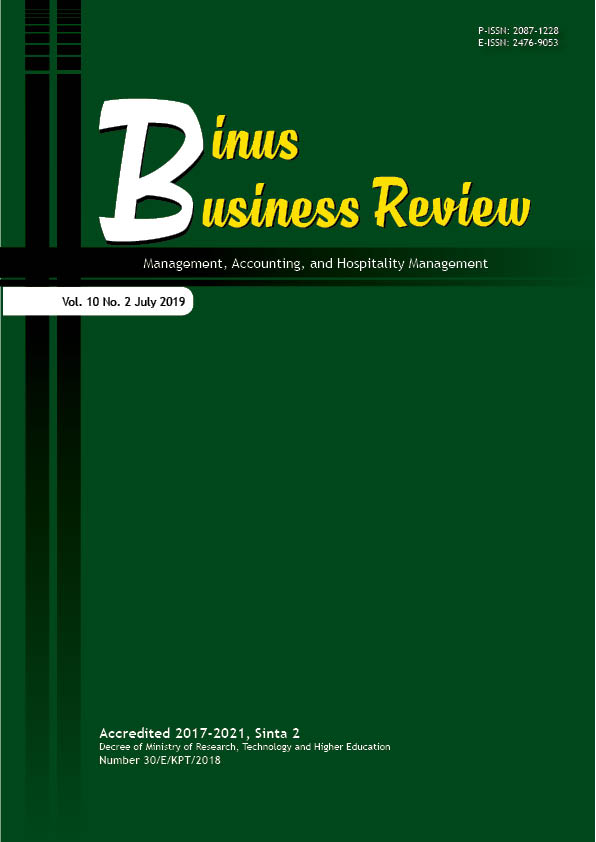The Effect of Green Accounting Implementation on Improving the Environmental Performance of Mining and Energy Companies in Indonesia
DOI:
https://doi.org/10.21512/bbr.v10i2.5767Keywords:
green accounting, environmental performance, mining and energy companiesAbstract
The research explored implementation of green accounting that was taken from the green accounting concept containing quantitative and qualitative information reported by the company. The observation period of this research was three years from 2014 to 2016. The object of this research was the mining and energy companies registered in the Global Reporting Initiative (GRI) database in Indonesia. The data used were secondary data obtained from sustainability reporting with the GRI-G4 report type. Data analysis was using panel data regression with a random effect model approach. The results show that the implementation of green accounting in the form of recycled materials, renewable energy, and green cost allocation has a positive and significant effect on improving environmental performance. Conversely, Corporate Social Responsibility (CSR) fund allocations do not affect environmental performance.
References
Angelia, D., & Suryaningsih, R. (2015). The effect of environmental performance and corporate social responsibility disclosure towards financial performance (Case study to manufacture, infrastructure, and service companies that listed at Indonesia Stock Exchange). Procedia-Social and Behavioral Sciences, 211(November), 348-355. https://doi.org/10.1016/j.sbspro.2015.11.045
Ching, H. Y., Gerab, F., & Toste, T. H. (2014). Scoring sustainability reports using GRI indicators: A study based on ISE and FTSE4Good Price indexes. Journal of Management Research, 6(3), 29-48. https://doi.org/10.5296/jmr.v6i3.5333
Deegan, C. (2002). Introduction: The legitimising effect of social and environmental disclosures–A theoretical foundation. Accounting, Auditing & Accountability Journal, 15(3), 282-311. https://doi.org/10.1108/09513570210435852
Deswanto, R. B., & Siregar, S. V. (2018). The associations between environmental disclosures with financial performance, environmental performance, and firm value. Social Responsibility Journal, 14(1), 180-193. https://doi.org/10.1108/SRJ-01-2017-0005
González-RodrÃguez, M. R., DÃaz-Fernández, M. C., & Simonetti, B. (2015). The social, economic and environmental dimensions of Corporate Social Responsibility: The role played by consumers and potential entrepreneurs. International Business Review, 24(5), 836-848. https://doi.org/10.1016/j.ibusrev.2015.03.002
Hendratno, S. P. (2016). Corporate point of view in green accounting. Binus Business Review, 7(3), 247-253. https://doi.org/10.21512/bbr.v7i3.1499
Hussain, M. D., Halim, M. S. B. A, & Bhuiyan, A. B. (2016). Environmental accounting and sustainable development: An empirical review. International Journal of Business and Technopreneurship, 6(2), 335-350.
Khoirina, M. M. (2016). Analysis of green accounting to support Corporate Social Responsibility (Case study: Semen Gresik Hospital). AKRUAL: Jurnal Akuntansi, 8(1), 1-10.
Khoiruman, M., & Haryanto, A. T. (2017). Green purchasing behavior analysis of government policy about paid plastic bags. Indonesian Journal of Sustainability Accounting and Management, 1(1), 31-39. https://doi.org/10.28992/ijsam.v1i1.25
Lako, A. (2017). Ecological crisis and urgency of green accounting. Majalah Akuntan Indonesia, (July-August), 1-11. DOI: 10.13140/RG.2.2.21872.15361
Latan, H., Chiappetta Jabbour, C. J., Lopes de Sousa Jabbour, A. B., Wamba, S. F., & Shahbaz, M. (2018). Effects of environmental strategy, environmental uncertainty and top management’s commitment on corporate environmental performance: The role of environmental management accounting. Journal of Cleaner Production, 180(April), 297-306. https://doi.org/10.1016/j.jclepro.2018.01.106
Lisi, I. E. (2015). Translating environmental motivations into performance: The role of environmental performance measurement systems. Management Accounting Research, 29(December), 27-44. https://doi.org/10.1016/j.mar.2015.06.001
Marota, R. (2017). Green concepts and material flow cost accounting application for company sustainability. Indonesian Journal of Business and Entrepreneurship (IJBE), 3(1), 43-51. https://doi.org/10.17358/ijbe.3.1.43
Mastromonaco, R. (2015). Do environmental right-to-know laws affect markets? Capitalization of information in the toxic release inventory. Journal of Environmental Economics and Management, 71(May), 54-70. https://doi.org/10.1016/j.jeem.2015.02.004
Masud, M. A. K., Bae, S. M., & Kim, J. D. (2017). Analysis of environmental accounting and reporting practices of listed banking companies in Bangladesh. Sustainability, 9(10), 1-19. https://doi.org/10.3390/su9101717
Mattmann, M., Logar, I., & Brouwer, R. (2016). Hydropower externalities: A meta-analysis. Energy Economics, 57(June), 66-77. https://doi.org/10.1016/j.eneco.2016.04.016
Megwai, G., Njie, N. I., & Richards, T. (2016). Exploring green economy strategies and policies in developing countries. International Journal of Green Economics, 10(3-4), 338-357. https://doi.org/10.1504/IJGE.2016.081905
Nazari, J. A., Hrazdil, K., & Mahmoudian, F. (2017). Assessing social and environmental performance through narrative complexity in CSR reports. Journal of Contemporary Accounting & Economics, 13(2), 166-178. https://doi.org/10.1016/j.jcae.2017.05.002
Qiu, Y., Shaukat, A., & Tharyan, R. (2016). Environmental and social disclosures: Link with corporate financial performance. British Accounting Review, 48(1), 102-116. https://doi.org/10.1016/j.bar.2014.10.007
Tu, J. C., & Huang, H. S. (2015). Analysis on the relationship between green accounting and green design for enterprises. Sustainability, 7(5), 6264-6277. https://doi.org/10.3390/su7056264
Zhou, P., Delmas, M. A., & Kohli, A. (2017). Constructing meaningful environmental indices: A nonparametric frontier approach. Journal of Environmental Economics and Management, 85(September), 21-34. https://doi.org/10.1016/j.jeem.2017.04.003
Zulhaimi, H. (2015). Pengaruh penerapan green accounting terhadap kinerja perusahaan. Jurnal Riset Akuntansi dan Keuangan, 3(1), 603-616.
Downloads
Published
How to Cite
Issue
Section
License
Authors who publish with this journal agree to the following terms:
a. Authors retain copyright and grant the journal right of first publication with the work simultaneously licensed under a Creative Commons Attribution License - Share Alike that allows others to share the work with an acknowledgment of the work's authorship and initial publication in this journal.
b. Authors are able to enter into separate, additional contractual arrangements for the non-exclusive distribution of the journal's published version of the work (e.g., post it to an institutional repository or publish it in a book), with an acknowledgment of its initial publication in this journal.
c. Authors are permitted and encouraged to post their work online (e.g., in institutional repositories or on their website) prior to and during the submission process, as it can lead to productive exchanges, as well as earlier and greater citation of published work.
USER RIGHTS
All articles published Open Access will be immediately and permanently free for everyone to read and download. We are continuously working with our author communities to select the best choice of license options, currently being defined for this journal as follows: Creative Commons Attribution-Share Alike (CC BY-SA)





















